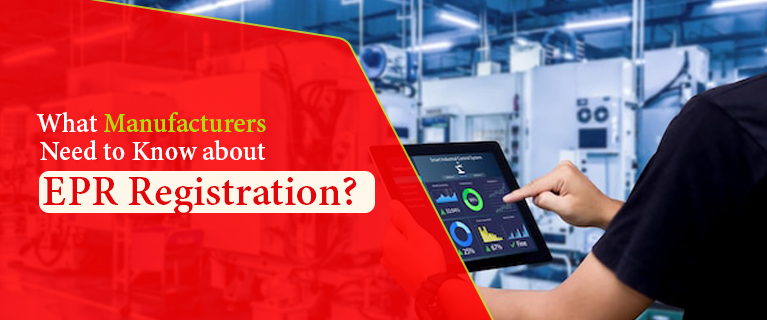EPR Registration For Small Businesses
In today's rapidly evolving world, sustainability has become a key focus for businesses of all sizes. With increasing environmental concerns and regulatory requirements, small businesses are realising the importance of adopting sustainable practices to minimise their ecological footprint. One significant step towards achieving sustainability goals is obtaining Extended Producer Responsibility (EPR) registration. EPR registration not only demonstrates a commitment to environmental stewardship but also offers several benefits for small businesses. In this blog, we will explore the importance of EPR registration for small businesses, its advantages, and how it can contribute to both sustainability and business growth.
What is EPR Registration?
Extended Producer Responsibility (EPR) is a legal policy ensuring that manufacturers are responsible for the entire lifecycle of their products, including their post-consumer phase. EPR registration is the process by which businesses fulfil their legal obligations by taking responsibility for managing the environmental impacts of their products throughout their lifecycle. It involves the implementation of sustainable waste management practices, recycling initiatives, and meeting recycling targets set by regulatory authorities.
Importance of EPR Registration for Small Businesses:
EPR registration is particularly important for small businesses for several reasons:
1. Environmental Compliance:
EPR registration ensures that small businesses comply with environmental regulations and legal requirements related to waste management. By obtaining EPR registration, small businesses demonstrate their commitment to sustainable practices, protecting the environment, and minimising the negative impact of their products on ecosystems.
2. Reputation and Brand Image:
In today's socially conscious marketplace, consumers increasingly prefer businesses that prioritise environmental sustainability. EPR registration enhances a small business's reputation and brand image by showcasing its commitment to responsible production and waste management.
3. Cost Savings:
Implementing EPR practices can lead to significant cost savings for small businesses. By optimising waste management processes, reducing the volume of waste generated, and promoting recycling and reuse, businesses can minimise disposal costs and potentially even generate additional revenue through the sale of recyclable materials.
4. Increased Efficiency:
EPR registration prompts small businesses to adopt more efficient and sustainable production processes. By analysing the lifecycle of their products, businesses can identify areas for improvement, optimise resource utilisation, and reduce waste generation. This increased efficiency not only benefits the environment but also enhances the overall productivity and competitiveness of the business.
5. Access to New Markets:
EPR registration can open doors to new market opportunities for small businesses. Many government agencies and large corporations prioritise working with environmentally responsible suppliers. By obtaining EPR registration, small businesses gain a competitive advantage and increase their chances of securing contracts and partnerships with entities that prioritise sustainability.
6. Collaboration and Networking:
EPR registration encourages small businesses to collaborate and network with other stakeholders in the recycling and waste management ecosystem. Through participation in industry events, conferences, and forums, small businesses can share best practices, learn from industry experts, and explore potential partnerships. This collaboration fosters innovation, knowledge sharing, and growth opportunities within the sustainability sector.
7. Long-term Sustainability:
EPR registration supports the long-term sustainability of small businesses by promoting a circular economy. The circular economy model aims to minimise waste, maximise resource efficiency, and promote the reuse, repair, and recycling of products. By incorporating EPR principles into their operations, small businesses contribute to a more sustainable future and reduce their reliance on finite resources.
Read Also This - The Economic Benefits of EPR RegistrationSteps to Obtain EPR Registration:
Obtaining EPR registration involves a few key steps:
1. Understand Legal Requirements:
Small businesses should familiarise themselves with the specific EPR regulations and requirements applicable in their region or industry. This includes understanding the types of products covered, recycling targets, reporting obligations, and compliance deadlines.
2. Establish Internal Systems:
Businesses need to establish robust internal systems to manage their EPR responsibilities effectively. This may involve setting up waste segregation and recycling processes, collaborating with authorised recyclers, and keeping accurate records of product life cycles and waste management activities.
3. Identify Authorised EPR Agencies:
Small businesses must identify and engage with authorised EPR agencies or compliance schemes in their jurisdiction. These agencies facilitate the collection and recycling of waste on behalf of businesses, ensuring compliance with EPR regulations. They provide guidance on reporting, auditing, and meeting recycling targets.
4. Track and Report:
Small businesses need to implement systems for tracking and reporting their waste management activities. This includes keeping records of the quantity and types of waste generated, recycling rates, and compliance with recycling targets. Regular reporting to the authorised EPR agencies is essential to maintain compliance.
Read Also This - How EPR Certification Promotes Responsible Consumption5. Continuous Improvement:
EPR registration is not a one-time event but an ongoing commitment to sustainability. Small businesses should continually evaluate and improve their waste management practices, explore innovative recycling technologies, and stay updated with evolving EPR regulations to ensure ongoing compliance and improvement.
In conclusion, EPR registration is a crucial step for small businesses looking to embrace sustainability, reduce their environmental impact, and position themselves for long-term growth. By obtaining EPR registration, small businesses can comply with environmental regulations, enhance their reputation, access new markets, and achieve cost savings through improved waste management practices. EPR registration also fosters collaboration, networking, and innovation within the sustainability sector. Embracing EPR principles not only benefits the environment but also contributes to the overall success and resilience of small businesses in a rapidly changing business landscape.




Comments
Post a Comment